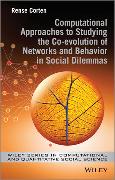Computational Approaches to Studying the Co-evolution of Networks and Behavior in Social Dilemmas
BücherAngebote / Angebote:
Presents empirical testing of computational models for social networks and behavior
Social networks play an important role in explanations of outcomes of social dilemmas, situations in which goal-directed individual action can lead to a collectively suboptimal outcome. Among these dilemmas are the cooperation and coordination problems that underlie many social phenomena. In most research on network effects in social dilemmas, networks are considered as static, exogenously determined structures. Yet social network structures often result from individual choices of relations. What happens when actors can not only choose their behavior in social dilemmas, but can also purposefully change the social network in which these interactions are embedded?
This book presents theoretical answers to this question, along with experimental and non-experimental empirical studies in which implications of the theoretical models are tested. The studies presented highlight the diverse ways in which computer simulation can be used to bridge abstract theoretical models and empirical applications.
This book:
* Explores an important theoretical puzzle which is only rarely explicitly modeled
* Combines game-theoretical modeling with empirical research
* Combines different types of empirical research: lab experiments and survey researchin a field setting
* Uses computer simulation to explore implications of the models, and also to generate specific testable hypotheses for research
Academic researchers, postgraduate students, sociologists, economists, and all social scientists with an interest in social dilemma research, social network analysis and computational methods
Lieferbar in ca. 10-20 Arbeitstagen




